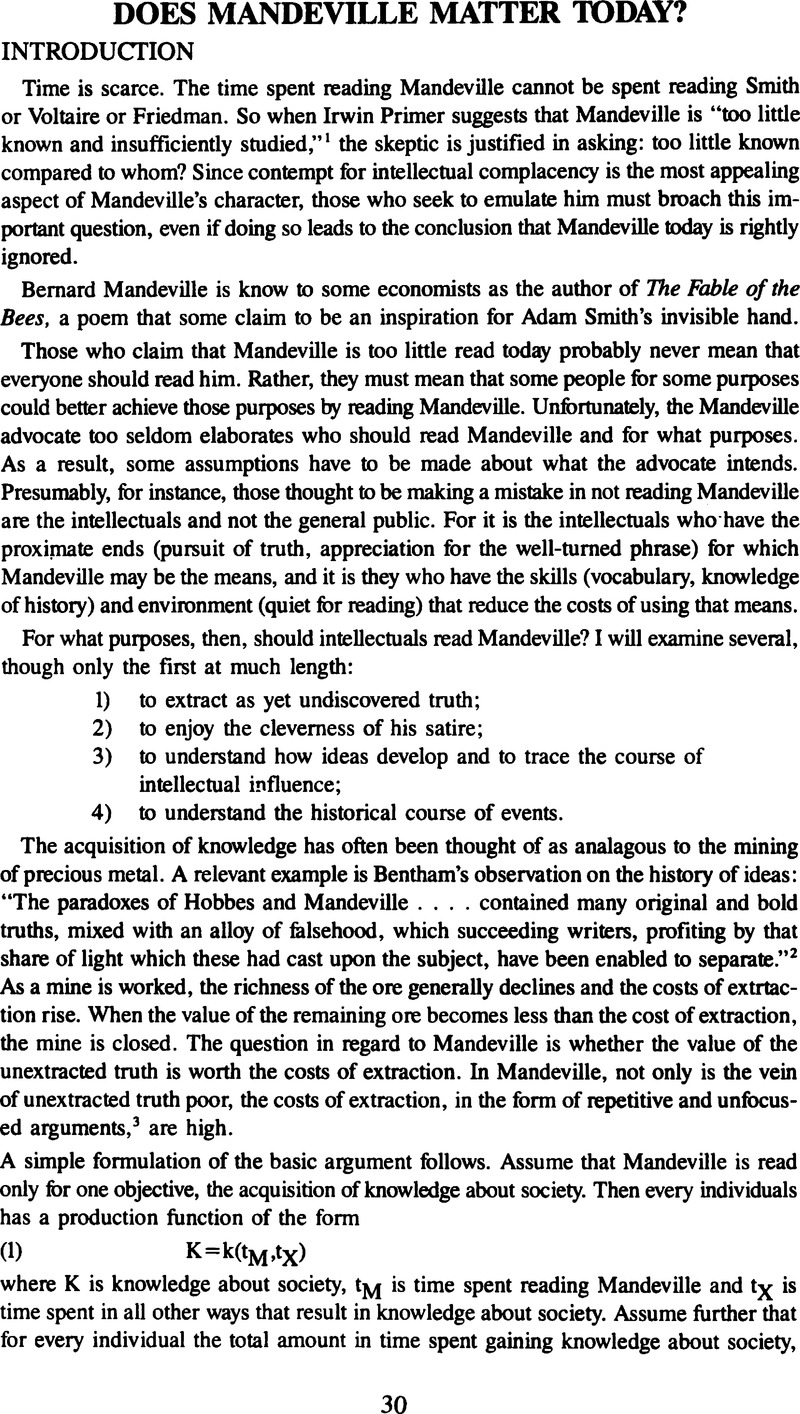Article contents
Does Mandeville Matter Today?
Published online by Cambridge University Press: 18 September 2015
Abstract

- Type
- Short Papers
- Information
- Copyright
- Copyright © Cambridge University Press 1985
References
FOOTNOTES
* The paper was first presented at the October, 1980 Huntington Library Symposium on Mandeville and Liberty. I am grateful to Liberty Fund for support and to David Levy and other symposium participants for comments.
1 Primer, Irwin, ed., Mandeville Studies (The Hauge: Martinus Nyhoff, 1975), p. XIIICrossRefGoogle Scholar.
2 Bowring, John, ed., The Works of Jeremy Bentham, Vol. X (Edinburgh: William Tait, 1843), p. 43Google Scholar.
3 A minor cost is Mandeville's occasional carlessness with quotes and facts, although I am not prepared to claim that he is worse in this regard than most of his contemporaries. For examples, see Kayes's footnotes in The Fable (pp. 127, 154-55, 165, 175, 186, 195, and 301.) Note in particular, Mandeville's false charge that some English colleges provided students with a monthly allowance for prostitutes (p. 99).
4 For this and other related evidence see Cole, Jonathan S. and Cole, Stephen, Social Stratification in Science (Chicago: The University of Chicago Press, 1973), pp. 21–23Google Scholar.
5 Such a search can be performed (at cost) by any research library that subscribes to the Dialog service of the Lockheed Company.
6 Garfield, Eugene Chairman, Social Science Citation Index (Philadelphia: Institute for Scientific Information)Google Scholar.
7 Perhaps some of the frequent citors are victims of what Robert Merton calls “adum brationism” (the fanatical search for obscure forbears). See Merton, Robert K., “Singletons and Multiples in Science,” in The Sociology of Science, (Chicago: The University of Chicago Press, 1973), pp. 343–70Google Scholar. For a wonderful satire of adumbrationism see: Merton, Robert K., On the Shoulders of Giants: A Shandean Postscript (New York: The Free Press, 1965)Google Scholar.
8 Hayek, F. A., “Dr. Bernard Mandeville,” in The Studies in Philosophy, Politics, Economics and the History of Ideas (Chicago: The University of Chicago Press, 1978), pp. 249–66CrossRefGoogle Scholar.
9 Milton, and Friedman, Rose, Free to Choose (New York: Harcourt Brace Jovanovich, 1980)Google Scholar.
10 Friedman, Milton, Capitalism and Freedom (Chicago: The Univrsity of Chicago Press, 1962)Google Scholar.
11 Hayek, Friedrich A., “The Use of Knowledge in Society,” in Individualism and Economic Order (Chicago: Henry Regnery Company, 1972), pp. 77–91Google Scholar.
12 Nozick, Robert, Anarchy, State and Utopia (New York, Basic Books, Inc., 1974)Google Scholar.
13 Rand, Ayn, Atlas Shrugged (New York: Random House, 1957)Google Scholar.
14 Smith, Adam, The Wealth of Nations (Chicago: The University of Chicago Press, 1976)Google Scholar.
15 Smith, Adam, The Theory of Moral Sentiments (Indianapolis: Liberty Classics, 1976)Google Scholar.
16 If I read him right David Levy claims that in Mandeville he found a justification for the view that ethical beliefs do not influence behavior. When I read Mandeville, however, I find no such justification. Mandeville does persuasively argue that people often do not practice what they preach. But everyone grants that. To make the case that ethical beliefs do not influence behavior, a stronger argument is needed, perhaps along the Stigler-Becker line that all human values are universal and stable. Whether that line, or some other, proves fruitful, progress will probably require independent thought and research rather than reading Mandeville. See: Levy, David, “Rational Choice and Morality: Economics and Classical Philosophy,” History of Political Economy 14 (Spring 1982): 1–36CrossRefGoogle Scholar; Stigler, George J. and Becker, Gary S., “De Gustibus Non Est Disputandum,” The American Economic Review 67 (March 1977): 76–90Google Scholar; and Diamond, Arthur M. Jr., “Stable Values and Variable Constraints: the Sources of Behavioral and Cultural Differences,” Journal of Business Ethics 1 (1982): 49–58CrossRefGoogle Scholar. Incidentlly, the Editor tells me that David will write a “Reply” to my remarks in the Summer issue of the Bulletin.
17 The reference for the 1978 volume is: 1978 MLA International Bibliography of Books and Articles on the Modem Languages and Literatures (New York: Modern Language Association, 1979)Google Scholar.
18 See, for example: Stigler, George J., “Do Economists Matter?” Southern Economic Journal (January 1976), pp. 347–354CrossRefGoogle Scholar.
19 See the discussion in: Stigler, George J., “The Scientific Uses of Scientific Biography with Special References to J. S. Mill,” in Robson, John M. and Laine, Michael, eds., James and John Stuart Mill/Papers of the Centenary Conference (Toronto: University of Toronto Press, 1976), pp. 55–66Google Scholar.
20 For a philosophical-sociological, disorganized (untestable?), but suggestive attempt in this direction see: Toulmin, Stephen, Human Understanding, Vol. 1 (Princeton: Princeton University Press, 1972)Google Scholar. For a couple of other attempts see: Levy, David Milton, “The Content and Acceptance of Classical Economic Theory: An Estimation,” Ph.D. Dissertation, University of Chicago, September 20, 1977 versionGoogle Scholar; and Diamond, Arthur Mansfield Jr., “Science as a Rational Enterprise,” Ph.D. dissertation, University of Chicago, 1978Google Scholar.
21 Cook, Richard I., “The Great Leviathan of Lechery': Mandeville's Modest Defense of the Public Stews (1724)” in Primer, Irwin, ed., Mandeville Studies, p. 23Google Scholar.
- 1
- Cited by




